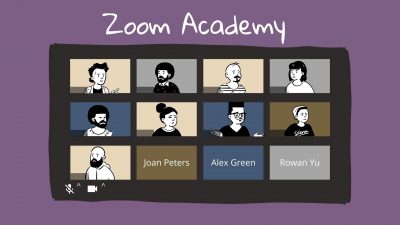When Boston University went completely online in the Spring, one of the most commendable changes the administration implemented was its Credit-No Credit policy.

This Fall, BU launched into an official Learn from Anywhere model where students can, well, learn from anywhere. Because we came in supposedly prepared, that grading system is not on offer this time around.
Students, however, are circulating a petition to get it back.
And they are right. Some students now need Credit-No Credit more than ever, while others — those who have adjusted well and are in a good place despite everything — can lose nothing from simply having this option.
Although we knew the school year would return in a fairly similar format as that of the Spring, there was no way for us to predict just how heavy a toll this semester would take.
No matter mentally prepared we were to take this on, we are still guinea pigs, thrown into uncertain waters and forced to float in overwhelming turbulence.
Mental health has gone down the drain for many of us, though that’s only one out of a plethora of disadvantages that make a normal year’s grading system unfair this semester. Still, let’s address this one first.
Issues surrounding mental health are not new, but the lack of social connection right now paired with absolute societal chaos — a nasty presidential election, explosive civil unrest, devastating death counts — have created a distractingly discouraging atmosphere for college students.
Days are monotonous and isolating when we stare for hours at other humans through a blue-lit screen and become uncomfortably aware whenever we walk within six feet of someone. All the restrictions on campus can be anxiety-inducing, yet all we can hope each time we enter the library or stop at the dining hall is that this won’t be the event that sends us into two-week-long isolation.
Apart from mental health, it’s critical to remember other factors — like the economic recession that has hit families worldwide — are contributing immense additional stress to the students affected.
If a student at home now has to work full-time at their family business because it can no longer hold onto its employees, how can they succeed in school? Circumstances like these are not part of the normal university experience, and must be accounted for.
Those learning from home are also void of the productive environment a campus provides, and must battle ample distractions or other barriers that can prohibit them from reaching their full academic potential.
Additionally, our experience with online learning in the Spring was not sufficient enough to prepare us for a productive Fall semester.
We appreciate our professors and their efforts, but that doesn’t change the reality that many are still unable to properly teach on Zoom. Technology poses so many difficulties for some professors that students can spend more time waiting for their instructor to find the “Share Screen” button than they do learning the material.
In no way is our current education comparable to in-person learning, and students’ grades are suffering because of it.
Credit-No Credit is beneficial for everyone because it is not mandatory. If you want to make sure you have letter grades on your transcript so that graduate schools can see specifically how hard you worked, then you don’t have to opt into the service.
But if you feel your grades are actively plummeting because of certain uncontrollable aspects of life in a pandemic, then you have a much-appreciated safety net for your grade point average.
An inadvertent result of this option, however, is that students may then find less motivation to study hard — but that is not the University’s doing.
Students who truly have ambitions to attend grad school or get that competitive job will still work to achieve that A, and those who take advantage of the system as an excuse to not study know their “credit” designation will count for less on a transcript.
As student journalists, for example, the option comes as an especially needed fallback during such a tumultuous semester. Prioritizing stories over schoolwork is a choice many editors find themselves making even during normal semesters, but carrying out our work remotely while adjusting to new safety concerns adds an even heftier load.
Our lives revolve around delivering to the BU community the breaking news it needs to know, whenever that happens to be. With 40–50 hours of work for The Daily Free Press per week on top of classes and other extracurriculars, the lack of sleep we get only further inhibits academic performance.
Though the same issue arises every semester, this year’s frenzied news cycle both on campus and in the city during current health and civic circumstances makes us all the more in need of a break.
An additional semester of Credit-No Credit may seem to be a prolonged solution for something that will likely not end anytime soon. But in the grander picture, that’s okay. Those who need this crutch during a pandemic that has devastated so many families should have the option to use it until our learning environment returns to a normal state.
So, when the University inevitably begins reinstating in-person learning once it’s safe, we can transition back to normal grading — because a remote work environment is not reflective of the way we will live the rest of our professional lives after graduation, and it shouldn’t be treated as such.
The University can make adjustments so as to not incentivize students to see the choice as a cop-out from academics. For instance, new limitations could restrict how many classes can be designated “credit” or “no credit,” as well as what types of classes offer the designation at all.
Additionally, professors have proven to vary in how lenient their grading is this semester. As much as it is the University’s responsibility to set up fair policies that will better the student experience, professors must also be aware of the strenuous times we are all facing.
Professors who need help must actively seek out additional trainings on Zoom and other internet software so they can have the best possible understanding of the technology they have to use. They should also provide students more access to current grades so we can be made aware of our own academic standing.
Even beyond this pandemic, the University might want to continue select practices from LfA that give students the flexibility and access to earn a BU degree from anywhere in the world. If we continued with certain aspects of virtual education, those who prefer online learning can choose that option and those who don’t can return in person.
But that would make remote learning a choice, and right now, none of us have that freedom. So until students have some autonomy again over the education they signed up for, BU’s Credit-No Credit policy is one tangible way for the University to show it cares about its students.




